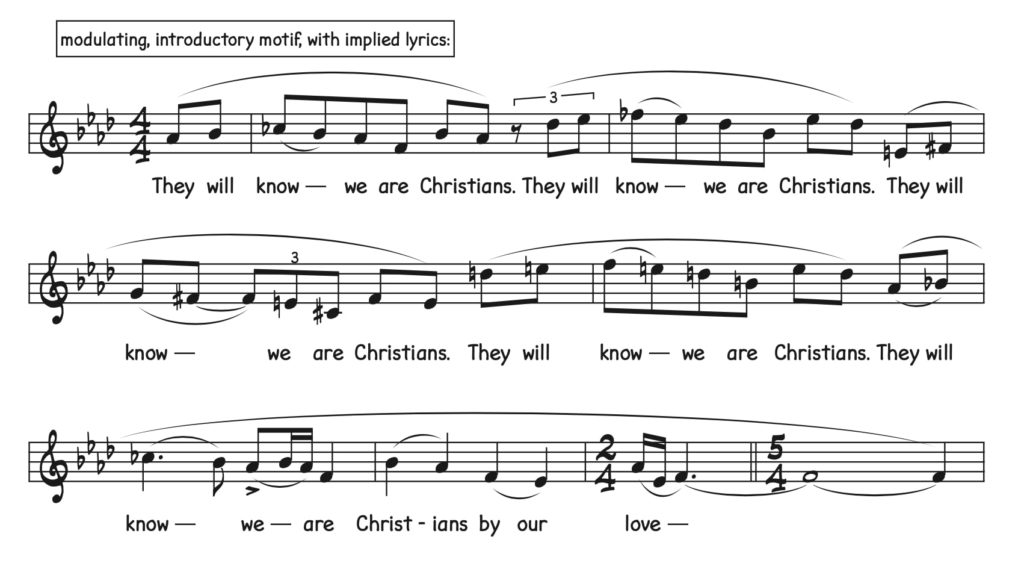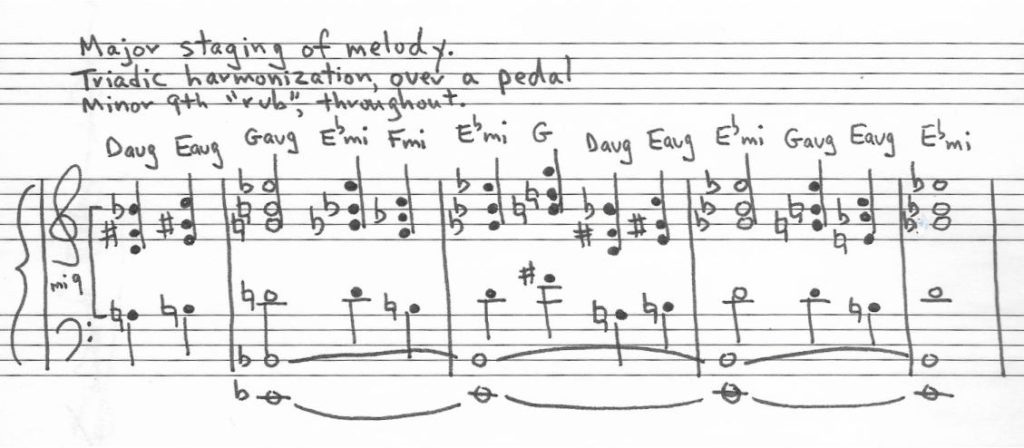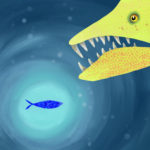by Earl MacDonald, composer/arranger
For the select few who might be intrigued to hear about the musical choices and techniques which shaped my arrangement of Peter Scholtes‘ “They’ll Know We Are Christians,” this article is for you.
Although I wouldn’t classify this piece as program music, in the strictest sense, there are certainly programatic elements. Specific sounds and textures depict personalities, sentiments and experiences. For example, drums embody feelings of disquietude, unrest, and discord. Both at the beginning, and later in the piece, the drums intentionally play out-of-time and against the music, rather than keeping a supportive beat. This device heightens tension and suggests all isn’t right in the world.
The melody fragment which corresponds with the lyrics, “They will know we are Christians” is a recurring motive throughout the piece. I first used it in the introduction, moving the motive to different transposition levels. I pictured little clusters of Christians singing this statement, in unison, with an inexpressive, whiny vocal quality. Differing instrumental combinations were employed on each repetition. The motive comes back again and again, even as a background figure behinds improvised solos.
the “They Will Know We Are Christians” Motif
This phrase, “they will know we are Christians,” expresses one of my greatest concerns — when I publicly profess my Christian faith, will people assume I am a gun-toting, anti-science, religious zealot, who shows contempt for migrants, women, the sick, the poor, and LGTBQ lives? (I’m not, by the way.) How did American Christianity stray so far from the teachings of Jesus? What led so many evangelical Christians to become one-issue voters with no regard for the plight of their sentient neighbors? Why are they so nonchalant and unrelenting in their collusion with a demagogue who inadvertently mocks their allegiance through his every word and action?
“Teacher, which is the greatest commandment in the Law?”
Jesus replied: “‘Love the Lord your God with all your heart and with all your soul and with all your mind.’ This is the first and greatest commandment. And the second is like it: ‘Love your neighbor as yourself.’ All the Law and the Prophets hang on these two commandments.”
Matthew 22:36-40
This is the crux of the piece in my mind. The whole world is watching, scrutinizing and forming opinions about the evangelical Christian community. They will know we are Christians by our _______. I hope Christians are concerned about the word(s) that accurately complete this sentence. Has swaying the balance of Supreme Court seats become a stronger, more powerful motivator than love? It appears so.
In Odd Meter
The melody is presented in 5/4 meter, over the following ostinato bass figure:
Settling upon 5/4 as the time signature was a gradual process. Triple meter was my first inclination. I imagined the groove bearing some resemblance to Elvin Jone’s deep, emotive ride cymbal pattern on McCoy Tyner’s song, “Contemplation.” Getting the original 4/4 melody to “lay right” in a new time signature involved lots of experimentation, singing and imagining the song in different ways, while on walks, in the shower and as I lay in bed at night. I explored 6/4, 7/4 and 5/4, eventually settling on 5. It felt quirky and “just wrong enough to feel right.”
Stepping (Harmonically) Outside
 A lengthy piano solo, in a modal jazz style, follows the initial melody statement. Rather than weaving through a complex sequence of chords, the pianist is given the rather vague chord symbol, “F minor-ish” as a launchpad for improvisation. In modal jazz, motion, tension and release are achieved by temporarily stepping outside the given mode. This practice metaphorically hints at the ideas of free will, defying convention, veering off the beaten path or drifting away from orthodoxy.
A lengthy piano solo, in a modal jazz style, follows the initial melody statement. Rather than weaving through a complex sequence of chords, the pianist is given the rather vague chord symbol, “F minor-ish” as a launchpad for improvisation. In modal jazz, motion, tension and release are achieved by temporarily stepping outside the given mode. This practice metaphorically hints at the ideas of free will, defying convention, veering off the beaten path or drifting away from orthodoxy.
After this lengthy piano solo, we get another taste of out-of-time drums. These lead to a chorale, overtop asynchronous, soloistic drum textures.
Before writing any piece of music, I typically brainstorm on paper, conjuring up all kinds of images and abstract thoughts related to the title. In this instance, because “They Will Know We Are Christians” was composed by a Catholic priest, I wrote many points related to Catholicism. These included Gregorian chant, monks, and cathedral reverberation. A chorale would be not only be appropriate, but inevitable!
Shiny Pennies
For this chorale, I manipulated the melody, transforming it from minor into major (from sad to happy). Symbolically, I was thinking of a certain personality one often sees in churches — the perpetually smiley, one dimensional, “shiny pennies.” These Ned Flanders types often appear unmoved and apathetic to all the injustices in the world. Perhaps some of them are genuinely bubbly, but I suspect many feel the need to suppress their true thoughts and feelings to fit a certain mold. Maybe they feel pressure to exhibit and exude some form of personal transformation, or maybe they prioritize avoiding conflict above all else. Whatever the case, this chorale section is dedicated to all the “happy clappy” Christians.
Christian Disunity
Like the rest of the piece, there needed to be “a rub” — some element of friction or strain, to indicate disunity within the body of Christ. I wanted to hint that all isn’t well with our collective souls. I pictured a slightly out-of-tune amateur choir, with a few overly enthusiastic, tone-deaf singers. To achieve this effect, I harmonized the entire melody with triads, plus a minor ninth interval consistently below the melody. In doing so, I broke the rule of NEVER using minor ninths below a melody within a chord voicing. But, because it is used recurrently, it comes across as intentional. The ear accepts it as not being an isolated mistake. All of this appears over a droning pedal point.
A Small Glimmer of Light
The piece ends with a dark, low register chord. But, I didn’t want there to be an absence of hope at the end. The concluding ding of a bell provides a small glimmer of light. By following it, by following Him, maybe we can find our way out of this deep, dark cavern in which we find ourselves.
I can get on-board with Peter Scholtes’ lyric of praying that “all unity may one day be restored; and they’ll know we are Christians by our love.” We have a long way to go and much work to do.
*Watch the By Our Love animated short video on YouTube at: https://youtu.be/MM_9KT78VqM
*The audio single can be streamed and downloaded from Bandcamp, Spotify, deezer and Apple Music.




